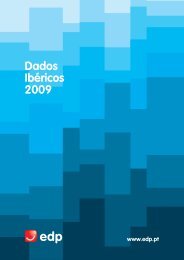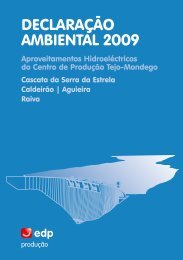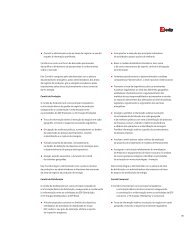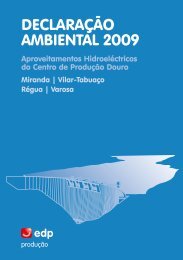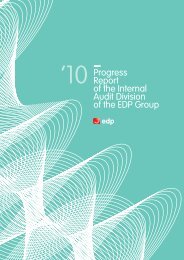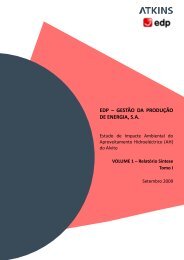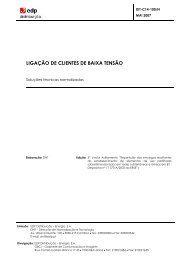Annual Report - EDP
Annual Report - EDP
Annual Report - EDP
- No tags were found...
Create successful ePaper yourself
Turn your PDF publications into a flip-book with our unique Google optimized e-Paper software.
: strategic framework :million at December 31, 2012, with 30% of thisamount being financed transitorily by electriccompanies.Although the Royal Decree-Law 6/2010 hadchanged the Law 54/1997, establishing that,from January 1, 2013, the network access tariffsshould be sufficient to recover the full costsof the regulated activities without any“ex-ante” deficit, the Royal Decree-Law 29/2012of December 31 has repealed this amendmentand settled that the whole deficit in 2012 can besecuritized without any limitation.The transfer of the deficit financed by electriccompanies to a Securitization Fund called FADE(Depreciation Fund of Electric Tariff Deficit)supported by the Spanish State is regulated bythe Royal Decree-Law 6/2010. Up to December31, 2012, electric companies have transferred toFADE a total amount of tariff deficit entitlementsof EUR 15,273 million.Since the beginning of 2012, the SpanishGovernment has taken important steps in orderto address the key aspects of the problem of thetariff deficit:1. Royal Decree-Law 1/2012 suspendedtemporarily all new renewable capacityregistration.2. Royal Decree-Laws 13/2012 and 20/2012reduced system costs in 2012 up to EUR1,000 million (in transmission and distributionactivities, in capacity payments to generators,in coal subsidies, in system operation andpayments to interruptible customers) whileincreasing system revenues in EUR 700 millionfrom some budget surpluses. Some of thesemeasures were only in force during 2012.3. Access charges were updated as from April2012 to all customers resulting in a revenueincrease for the system of EUR 1,600 millionthrough (i) ordinary increases of 5.1% onaverage and (ii) re-invoicing of tariffs in lastquarter of 2011 and first quarter of 2012. Thisre-invoicing is a consequence of several ordersof the Supreme Court because tariffs shouldhave been higher to cover all regulated costs.4. Royal Decree-Law 20/2012 approved arevenue increase for 2013 from regional taxesand additional access charges for higherconsumption levels which will contribute todeficit reduction in 2013. This legislation alsoeliminated the quarterly update of the accesstariffs during the year.5. Royal Decree-Law 2/2013, effective fromJanuary 1, 2013, encompasses a set ofregulatory modifications affecting the windenergy assets, namely:º º All the energy production facilitiesoperating under the special regime will beremunerated according with the currentfeed-in-tariff schemes for the remaininguseful life of the asset;º º The operators of the facilities under thespecial regime currently operating underthe market option have the option to select,until February 15, 2013 and for the remaininguseful life of the asset, a remunerationbased on the electricity wholesale marketprice without the renewable energypremium, the cap or the floor;º º The index used to annually update all theregulated activities in the electricity sectorwill be the annual inflation excluding energyproducts and food prices, and any impact oftax changes.<strong>EDP</strong> - <strong>Annual</strong> <strong>Report</strong> 2012Energy taxationThe Law 15/2012 approved a new EnergyTaxation scheme, coming into force in 2013,with the aim of battling the problem of the tariffdeficit and putting the energy system back intoan economically sustainable path. The followingtaxes were created:1. Tax on nuclear waste (€ 2,190 per kilogramof nuclear waste, what represents around 10%of revenues).2. Levy on hydro generation (22% of revenues).3. Carbon tax on fossil fuels:º º Natural gas (€ 0.65/GJ for all customersexcept non-electric professional use:€ 0.15/GJ);º º Coal for power generation (€ 0.65/GJ);º º Fuel for power generation (€ 12.00/ton);º º Diesel for power generation (€ 29.15/1000l).4. Tax on electricity production (single tax of 7%of revenues) on all power generation regardlesswhether it is produced under the so-calledOrdinary (conventional plants) or SpecialRegime (renewable and CHP power plants).The Spanish Government estimates that the totalvalue of these measures amounts to EUR 3,500million, using this sum to reduce the tariff deficitin addition to the transfer of a maximum of EUR450 million of CO 2allowances revenues from theGeneral State Budget (Law 17/2012).In the Spanish Gas Sector, at March 31, waspublished the Royal Decree-Law 13/2012, thatreviews the Law 34/98 and transposes intoSpanish law the “third energy package”, updatingthe natural gas sector’s framework laws, beingworthy of special mentioning the independentnetwork management model definition.It is also worth mentioning, given the potentialimpact on the sector, the publication on December27 of the Law 15/2012 that sets up fiscalmeasures for the energy sustainability and theMinisterial Order IET/2814/2012 that establishesthe tariffs and the revenues related with theaccess to the gas sector installations by thirdparties, eliminating the revenues updates for thetransport and distribution activities, as it definesas zero the efficiency factor applied to theseinfrastructures.Tariff developmentsin Portugal and SpainNOMINAL AND REAL AVERAGE ELECTRICITY PRICECHANGES FOR NLV IN PORTUGAL (%)(AS OF JANUARY OF EACH YEAR)4.33.4NOMINAL CHANGES2.92.3293.83.34.02009 2010 2011 2012REAL CHANGES - GDP DEFLACTORIn Portugal, the end user final tariffs for normallow voltage (NLV) customers increased on averageby 4.0% in January 1, 2012. On July 1,2012,following the regulated tariffs extinction forsupplies of NLV customers with contracted powerequal or over 10.35kVA, for which transitory tariffswere defined, the prices for these customers wereraised on average by 2.0%. With regard to networkaccess tariffs in 2012, the tariffs for NLV suppliesdiminished on average by 7.7%, while for theremaining voltage levels the tariffs increasedon average by 16.6%.3.9





